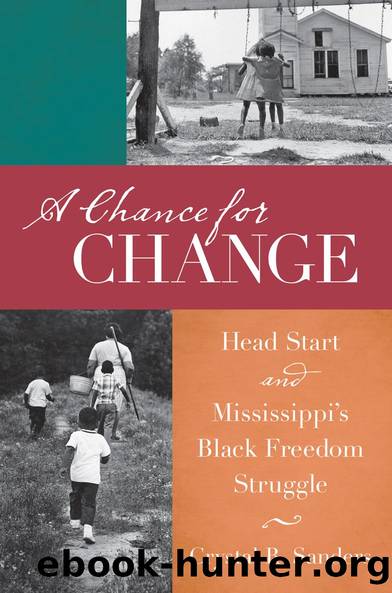A Chance for Change by Crystal R. Sanders

Author:Crystal R. Sanders [Sanders, Crystal R.]
Language: eng
Format: epub
Tags: Social Science, Ethnic Studies, American, African American & Black Studies
ISBN: 9781469627809
Google: DE0fjgEACAAJ
Barnesnoble:
Goodreads: 27110829
Publisher: University of North Carolina Press
Published: 2016-01-15T03:12:15+00:00
John Mudd (far right) confers with (left to right) CDGMâs deputy director Martin Cohn and CDGM board members Rev. James McRee, Marian Wright, and Adam Dan Beittel. (Johnson Publishing Company, LLC)
As CDGMâs acting director, Mudd tackled administrative issues. He recalled that initially Central Staff wanted nothing to do with him. âPeople were really angry. Thatâs why instead of getting into any big policy stuff, I said that one of the things I could do is get payroll out, so I phoned around to see who had indeed been working.â67 By September, however, Muddâs attention turned to more pressing matters. CDGMâs first grant had run out, so there was no more money. Except for Polly Greenberg, out-of-state resource teachers and Central Staff members had left Mississippi. Mudd began the arduous task of overseeing CDGMâs application for a year-round Head Start grant.
OEO policies, however, had changed. Now, Head Start applications submitted through community action agencies received priority over statewide nonprofit groups such as CDGM.68 Community action agencies ensured that mayors and other members of local political establishments, who had complained to OEO officials that community action usurped their power, had a say in what was going on in their communities. War on Poverty architects had intended for community action programs to originate in local communities through agencies. However, by 1965, few communities had community action agencies or had applied for grants, so OEO developed ânational-emphasisâ programs such as Head Start and Legal Services to show Congress that antipoverty funds were being used. After the programs were created, logic held that local people sitting on community action agency boards would sustain their tenure, hence the OEO decision to fund Head Start programs through agencies after the 1965 summer. OEO did not initially have precise requirements about racial and economic representation on local agencies, and some cities, towns, and counties formed agencies that did not include poor people or minorities and still received funding priority from OEO.69
In Mississippi, this policy meant that those opposed to CDGM could form a community action agency and control whether or not CDGM operated in their community. This fact was not lost on segregationists. CDGM supporters in Amite County tried unsuccessfully to participate in that countyâs newly formed community action agency. Only after they complained to OEO officials were they allowed to work in the agency-run Head Start program, but most were relegated to cooking in the kitchen.70 Mississippi State Sovereignty Commission director Erle Johnston would later explain to Stennis, âthere definitely has been a change of attitude toward Head Start because local people now realize if they donât do the job themselves, someone else will do it for them.â71 Community action agencies became a way for the white ruling class to strategically maintain the status quo.
John Mudd had little time to build relationships with local white citizens who sat on community action agency boards throughout Mississippi, because Stennisâs continued inquiries into CDGMâs program occupied his time. The senator publicly announced his plan to question OEO officials about CDGM
Download
This site does not store any files on its server. We only index and link to content provided by other sites. Please contact the content providers to delete copyright contents if any and email us, we'll remove relevant links or contents immediately.
Life in a Victorian School by Bob Mealing(174)
Math and Science Investigations by Sally Anderson(160)
Why Think? by Stanley Sara;(124)
Best Practices of Award-Winning Elementary School Principals by Harris Sandra K.;(116)
Introducing Research in Early Childhood by Bolshaw Polly;Josephidou Jo; & Jo Josephidou(113)
Wrestling with Writing by Nicholas D. Young & Bryan Thors Noonan & Kristen Bonanno-Sotiropoulos(111)
Loving Math by Unknown(107)
Transform Your K-5 Math Class by Amanda Thomas(99)
The Last Little Book About Big Words by James Roberts (Gentleman Jim)(99)
Nonfiction Notebooks : Strategies for Informational Writing by Aimee Buckner(83)
Brain-Compatible Activities for Mathematics, Grades 4-5 by Sousa David A.;(82)
Strategies to Integrate the Arts in Mathematics by Linda Dacey; Lisa Donovan(81)
Brain-Friendly Study Strategies, Grades 2-8 by Schwed Amy J.;Melichar-Utter Janice;(80)
Provoking Curiosity by Angela Eckhoff(79)
What If Your ABCs Were Your 123s? by Leslie Minton(76)
Art in the Early Years by Eglinton Kristen Ali;(73)
Making Music in the Primary School by Beach Nick;Evans Julie;Spruce Gary;(73)
Help! for Teachers of Young Children by Kaltman Gwendolyn S.;(70)
A Chance for Change by Crystal R. Sanders(65)
